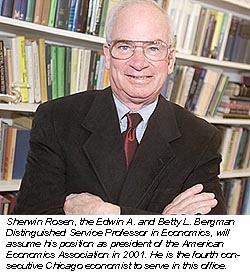Rosen to serve AEA as its president, starting in 2001
By William HarmsNews Office
 Sherwin Rosen, a micro-economist with expertise in labor economics and industrial organization, will become the fourth consecutive University economist to serve as president of the American Economics Association.
Sherwin Rosen, a micro-economist with expertise in labor economics and industrial organization, will become the fourth consecutive University economist to serve as president of the American Economics Association.
Rosen, the Edwin A. and Betty L. Bergman Distinguished Service Professor in Economics, will assume his duties as president at the association’s annual meeting in New Orleans in 2001. During the coming year, Rosen will appoint association members to serve on committees, look after budget issues and coordinate preparations for the 2001 meeting. Part of that preparation will include selecting papers to be presented at the gathering, which draws nearly 7,000 people.
For the past three years, the University has had a strong leadership presence in the association. D. Gale Johnson, the Eliakim Hastings Moore Professor Emeritus in Economics, served as the association’s president this year. Robert Fogel, the Charles R. Walgreen Distinguished Service Professor in the Graduate School of Business, was president in 1998, and Arnold Harberger, the Gustavus F. and Ann M. Swift Distinguished Service Professor Emeritus in Economics, held the post in 1997.
“It is a professional society that does not have an office in Washington, does not take positions on particular issues and does not do any lobbying,” said Rosen. “It is strictly an organization for the benefit of professional economists.”
Rosen’s interests are broad and have included theoretical and empirical work on product differentiation and incentive structures within organizations. Those interests have led him to research and write on a variety of topics, including ways in which food crops can be both consumption goods and capital goods. Rosen’s research in this area provides a new interpretation of the reasons the Irish potato famine, which began in 1845 and continued through 1847, was so devastating.
“Potatoes are not produced commercially from seed,” Rosen wrote in “Potato Paradoxes,” published in the Journal of Political Economy. “A significant portion of the crop is withheld from final consumption, and potato buds (or ‘eyes’) are replanted for next year’s crop.” Seed-crop capital is an important component in total production.
Ireland’s potato famine was probably the worst disaster of its kind in modern times. At least 12 percent of the population died, and another 6 to 8 percent migrated to other countries.
At the time of the famine, the rural poor of Ireland were extremely dependent upon potatoes, which they grew on small farms they managed as renters. “As difficult as it is to imagine today, on the eve of the famine, per capita consumption of potatoes is reliably estimated to have averaged nine pounds (40 to 50 potatoes) per person, per day,” Rosen wrote.
The problem of the famine, caused by a blight that killed the potato crop, was exacerbated because of the capital-goods issue. Farmers, believing the crop would flourish the following year, saved 30 percent of potatoes from the harvest so they would have seed for the next year.
“During the famine years, potato output fell by half in the first year,” Rosen wrote. “In the second year, there was no significant decline in planting relative to previous years, yet output fell by 80 percent. Cultivation dropped by major proportions thereafter. The long-run price of potatoes, relative to wheat and oats, almost doubled between pre- and post-famine eras, implying that the blight reduced permanent productivity by about 50 percent.”
Rosen’s findings dispute one of the widely held beliefs about the famine. Economists have contended that the potatoes were a Giffen good, one that increases in demand as its price rises. “The idea is that when a consumer is close to subsistence and specializes food consumption on one item, a reduction in its price frees up income for other purposes. If prices increase, expenditure on other things must fall to satisfy the survival constraint,” Rosen explained.
What happened during the famine, however, was that consumption fell as potatoes were hoarded for another year’s planting. Because consumption fell as prices increased, potatoes did not become a Giffen good during the famine.
“Since the Giffen paradox is not useful for understanding the Irish experience, is it asking too much for future writers of elementary texts to find another example? Fictions have no place in the teaching of economics,” Rosen concluded.
Rosen, who received an A.M. in 1962 and a Ph.D. in economics in 1966 from the University, has been a faculty member since 1977. He joined the faculty after serving on the faculty of the University of Rochester. He also is editor of the Journal of Political Economy.
![[Chronicle]](/images/small-header.gif)